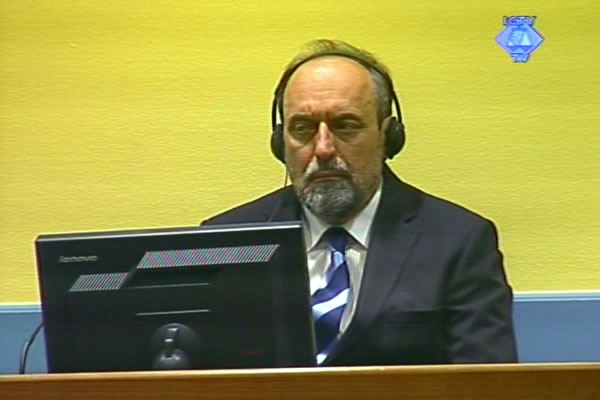Home
CONFIDENTIAL EXHUMATION DATA
In the brief cross-examination of Davor Strinovic, a forensic medicine expert from Zagreb, Goran Hadzic’s defense counsel brought up the restricted access to the documents on the exhumations kept by the Commission for Detained and Missing Persons of the Croatian government
 Goran Hadzic in the courtroom
Goran Hadzic in the courtroom Former Krajina Serb leader Goran Hadzic was absent from the courtroom on Monday, but returned on Tuesday to attend the cross-examination of Davor Strinovic, an expert in forensic medicine and a member of the Commission for Detained and Missing Persons of the Croatian government. The defense counsel asked the prosecution expert only a few questions that did not pertain directly to Strinovic’s evidence, which focused on the exhumations, post mortems and identification of victims of committed in Croatia.
Strinovic was involved in the post mortems and identification of the bodies recovered from the graves at the Ovcara farm near Vukovar, and in Dalj, Erdut, Lovas, Grabovac and other sites. Victims of crimes Hadzic is charged with were buried there.
In the cross-examination, the defense counsel put it to the witness that the data about the exhumations carried out under the auspices of the Croatian Commission for Detained and Missing Persons were shrouded in secrecy. The case files that contain the requests and orders for the exhumation, the records on the course and participants in the procedure, and photo and video materials are kept in the Commission’s archives: neither the prosecution nor the defense were granted access to them. Despite the fact that he was a member of that body, Strinovic said he didn’t know why access to the documents was restricted.
As some exhumation records state that either forensic medicine experts or pathologists took part in the exhumations, the defense counsel wanted Strinovic to explain the difference between the two professions. Strinovic explained that pathology explored ‘illnesses’ and focused on natural deaths while forensic medicine was there to investigate violent deaths. This is why exhumations mostly involved experts in forensic medicine. As Strinovic added, because ‘there were so many victims of war’, forensic medicine experts sometimes had too much work to do. As a result, pathologists who had been given some training in how to ‘dig bodies properly from the ground’ were sent to attend the exhumations.
The defense counsel asked the witness why there were pathologists and not forensic medicine experts in the Tribunal’s team that carried out the exhumations, that was headed by Dr. Clark. Strinovic explained this was a matter of different terminology. The team members were indeed experts in forensic medicine, he assured the defense counsel.
Goran Hadzic’s trial continues on Thursday with the evidence of a new prosecution expert.
Linked Reports
- Case : Hadzic
- 2013-01-07 CAUSE OF DEATH OF VICTIMS IN EASTERN SLAVONIA
- 2012-12-07 SUFFERING CONSEQUENCES OF DETENTION IN SERBIA
- 2012-12-03 PATTERN OF ‘HAVOC’ IN CROATIAN VILLAGES
- 2013-01-10 JNA WARNED OF CRIMES, LOCAL AUTHORITIES TURNED BLIND EYE
- 2013-01-11 CLOSE TIES BETWEEN HADZIC AND ARKAN
- 2013-02-06 HADZIC’S ‘DANCE’ WITH JNA
